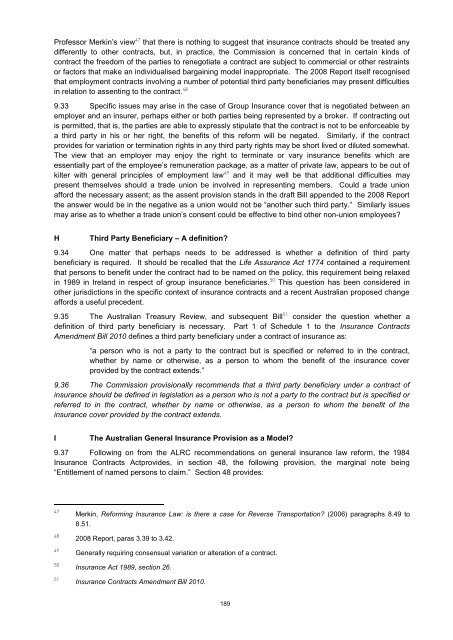Insurance Contracts CP - Law Reform Commission
Insurance Contracts CP - Law Reform Commission
Insurance Contracts CP - Law Reform Commission
Create successful ePaper yourself
Turn your PDF publications into a flip-book with our unique Google optimized e-Paper software.
Professor Merkin‘s view 47 that there is nothing to suggest that insurance contracts should be treated any<br />
differently to other contracts, but, in practice, the <strong>Commission</strong> is concerned that in certain kinds of<br />
contract the freedom of the parties to renegotiate a contract are subject to commercial or other restraints<br />
or factors that make an individualised bargaining model inappropriate. The 2008 Report itself recognised<br />
that employment contracts involving a number of potential third party beneficiaries may present difficulties<br />
in relation to assenting to the contract. 48<br />
9.33 Specific issues may arise in the case of Group <strong>Insurance</strong> cover that is negotiated between an<br />
employer and an insurer, perhaps either or both parties being represented by a broker. If contracting out<br />
is permitted, that is, the parties are able to expressly stipulate that the contract is not to be enforceable by<br />
a third party in his or her right, the benefits of this reform will be negated. Similarly, if the contract<br />
provides for variation or termination rights in any third party rights may be short lived or diluted somewhat.<br />
The view that an employer may enjoy the right to terminate or vary insurance benefits which are<br />
essentially part of the employee‘s remuneration package, as a matter of private law, appears to be out of<br />
kilter with general principles of employment law 49 and it may well be that additional difficulties may<br />
present themselves should a trade union be involved in representing members. Could a trade union<br />
afford the necessary assent; as the assent provision stands in the draft Bill appended to the 2008 Report<br />
the answer would be in the negative as a union would not be ―another such third party.‖ Similarly issues<br />
may arise as to whether a trade union‘s consent could be effective to bind other non-union employees?<br />
H<br />
Third Party Beneficiary – A definition?<br />
9.34 One matter that perhaps needs to be addressed is whether a definition of third party<br />
beneficiary is required. It should be recalled that the Life Assurance Act 1774 contained a requirement<br />
that persons to benefit under the contract had to be named on the policy, this requirement being relaxed<br />
in 1989 in Ireland in respect of group insurance beneficiaries. 50 This question has been considered in<br />
other jurisdictions in the specific context of insurance contracts and a recent Australian proposed change<br />
affords a useful precedent.<br />
9.35 The Australian Treasury Review, and subsequent Bill 51 consider the question whether a<br />
definition of third party beneficiary is necessary. Part 1 of Schedule 1 to the <strong>Insurance</strong> <strong>Contracts</strong><br />
Amendment Bill 2010 defines a third party beneficiary under a contract of insurance as:<br />
―a person who is not a party to the contract but is specified or referred to in the contract,<br />
whether by name or otherwise, as a person to whom the benefit of the insurance cover<br />
provided by the contract extends.‖<br />
9.36 The <strong>Commission</strong> provisionally recommends that a third party beneficiary under a contract of<br />
insurance should be defined in legislation as a person who is not a party to the contract but is specified or<br />
referred to in the contract, whether by name or otherwise, as a person to whom the benefit of the<br />
insurance cover provided by the contract extends.<br />
I<br />
The Australian General <strong>Insurance</strong> Provision as a Model?<br />
9.37 Following on from the ALRC recommendations on general insurance law reform, the 1984<br />
<strong>Insurance</strong> <strong>Contracts</strong> Actprovides, in section 48, the following provision, the marginal note being<br />
―Entitlement of named persons to claim.‖ Section 48 provides:<br />
47<br />
48<br />
49<br />
50<br />
51<br />
Merkin, <strong>Reform</strong>ing <strong>Insurance</strong> <strong>Law</strong>: is there a case for Reverse Transportation? (2006) paragraphs 8.49 to<br />
8.51.<br />
2008 Report, paras 3.39 to 3.42.<br />
Generally requiring consensual variation or alteration of a contract.<br />
<strong>Insurance</strong> Act 1989, section 26.<br />
<strong>Insurance</strong> <strong>Contracts</strong> Amendment Bill 2010.<br />
189

















